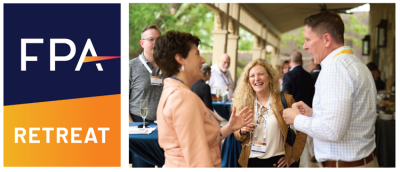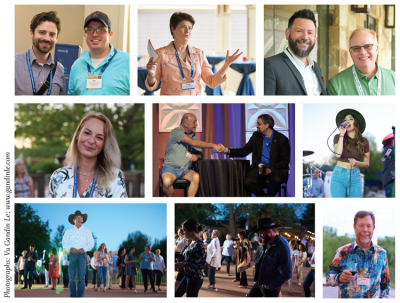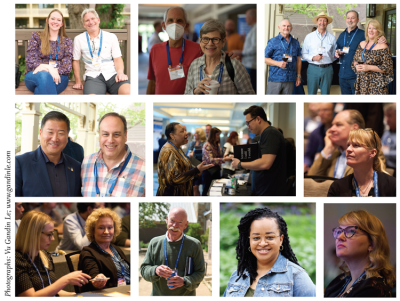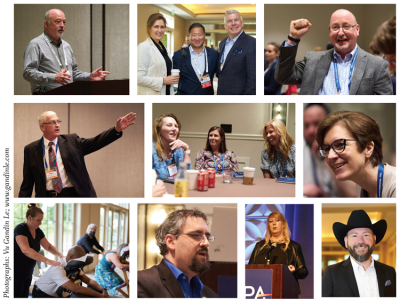Journal of Financial Planning: June 2022

Financial Planning Association members met for the first FPA live event in two years at FPA Retreat in Lost Pines, Texas, in late April.
“It felt great being back together in-person after two cancellation years. There was great energy around that and the excellent program the Task Force put together. The mix of thought-provoking keynote speakers, our diverse breakout sessions, and our interactive Under the Trees gatherings seemed to resonate very well with attendees,” said Ross Richardson, CFP®, chair of the FPA Retreat Task Force.
Keeping Promises
When Alex Sheen promised to mail 10 promise cards to anyone in the world, at no cost to anyone, “it was the dumbest decision I’ve ever made,” he joked with participants in the first keynote of the event.
Sheen is the founder of a social movement and nonprofit, because I said I would, that is “dedicated to the betterment of society through promises made and kept.” The nonprofit works with schools to conduct social emotional training like how to combat negative thinking, build resiliency, and manage time to help students keep their promises.
Today, Sheen has mailed over 13 million cards to people in 178 countries and has learned that the desire to live up to the best people expect of you transcends cultures.
“It is core and elemental to human existence,” he said.
Sheen was inspired by his father, a pharmacist and “man of his word” who died in 2012 of lung cancer. “My father was far from a perfect person, but he kept his promises,” Sheen told participants. The cards provide a measure of accountability to help people follow through on their promises, including ones they make to themselves.
He acknowledged that keeping promises is sometimes easier than making them. “People break promises, and water is wet,” he said. However, “the things we see as obligations in our lives could be somebody else’s best day.”
Sheen suggested reverse engineering objectives by “starting with what you want to have accomplished and work backwards to identify the steps you need to take.”
Promises ask people to think about what they want to do and can do some time in the future. That’s why they sometimes can’t follow through, Sheen said. “You are literally trying to predict the future.”

Being Curious
Austin Channing Brown joined participants via a livestream facilitated by Jewell N. Fears, a consultant on diversity, equity, and inclusion. Brown is the author of I’m Still Here: Black Dignity in a World Made for Whiteness.
Brown warned against assuming that experiences are universal. “Our pursuit of human dignity, honoring all the people around us and what is normal for them, is so important,” she said. In financial planning, there is a whole host of histories that we have to pay attention to.
She encouraged participants to be curious and ask questions. One of the ways to honor people from different backgrounds is to learn about their history, she said. “The only way we can ensure we are charting a healthy way forward is to understand the past. And you can’t assume that your past is the same as the person in front of you.”

Defying Expectations
Ageism is prejudice against our future selves, according to Ashton Applewhite, author of This Chair Rocks: A Manifesto Against Ageism.
We have collective biases against old age that start young and are unconscious, she said. Generational labels—silent, boomer, X, Y, Z, Alpha—are convenient but divisive. Equity in race, gender, age, and ability are all connected, she said. Diversity, equity, and inclusion practices should address age, and hiring practices should consider skill rather than how long someone has been alive.
She encouraged participants to do an “assumption check” and identify ways they might be unconsciously biased based on age. We can’t address bias unless we are aware of it, she said.

Managing Change
In the final keynote, Task Force chair Richardson hosted an open discussion with Michael Kitces about how he built his career. Kitces took questions from the audience and described how much of his work has changed over time. What a business needs changes as it grows, he said, and founders have to be comfortable with constant change.
“The point as a business owner when you’re no longer willing to change, to do those changes, is when your business stops growing,” he said. Those owners might still have a good income and day-to-day work, but they have to be satisfied with that. “When you stop changing as the founder is when the business stops growing.”
